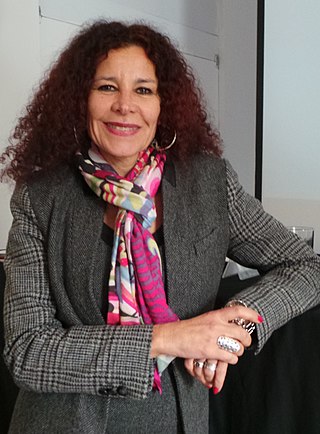
Elizabeth Cristina Salguero Carrillo is a Bolivian diplomat, journalist, politician, and women's rights activist who served as minister of cultures from 2011 to 2012. A member of the Movement for Socialism, she previously served as a party-list member of the Chamber of Deputies from La Paz from 2006 to 2009. In 2009, she was elected as a substitute party-list member of the Chamber of Deputies from La Paz but resigned before taking office in order to launch an ultimately unsuccessful La Paz mayoral campaign. From 2012 to 2015, she served as ambassador of Bolivia to Germany, and since then has worked as an international expert in strategic planning at UN Women.
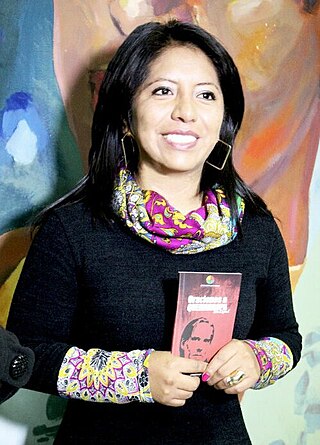
Nadia Alejandra Cruz Tarifa is a Bolivian lawyer and politician serving as vice minister of equal opportunities since 2022. Cruz developed her career practicing law in La Paz and El Alto, during which time she became an active member and advisor to various human rights NGOs. Starting in the 2010s, Cruz began serving as a public official in the Ombudsman's Office, where she exercised a multitude of minor functions before being appointed deputy ombudsman for the defense of and compliance with human rights. Following the intra-term resignation of David Tezanos Pinto in 2019, Cruz was among three deputy ombudsmen in the line of succession and was considered the only viable candidate to assume the position.
The Framework Law of Mother Earth and Integral Development for Living Well is a Bolivian law enacted on October 15, 2012. It is the successor to the Law of the Rights of Mother Earth and was initially designed as full version of that law. According to Derrick Hindery, "the law clearly reflects both the more environmentally progressive ideals pushed by the Unity Pact and the extractivist agenda of the Morales administration."

Mónica Eva Copa Murga is a Bolivian politician, social worker, and former student leader serving as mayor of El Alto since 2021. As a member of the Movement for Socialism, she previously served as senator for La Paz from 2015 to 2020, during which time she was president of the Senate from 2019 to 2020.

Rafael Arcángel Quispe Flores, often referred to as Tata Quispe, is a Bolivian indigenous activist and politician who served as general executive director of the Indigenous Development Fund from 2019 to 2020. He previously served as a substitute party-list member of the Chamber of Deputies from La Paz under María Eugenia Calcina from 2015 to 2019.

Andrónico Rodríguez Ledezma is a Bolivian cocalero activist, political scientist, politician, and trade unionist serving as president of the Senate since 2020. A member of the Movement for Socialism, he serves as senator for Cochabamba. Rodríguez's lengthy career in the cocalero union hierarchy saw him serve as general secretary of the 21 September Workers' Center from 2015 to 2016 and as executive of the Mamoré Bulo Bulo Federation from 2016 to 2018, in addition to a multitude of other minor positions. He has served as vice president of the Coordination Committee of the Six Federations of the Tropic of Cochabamba since 2018 and held office as president of the organization from 2019 to 2020 in the absence of the body's longtime leader, Evo Morales.

Oscar Miguel Ortiz Antelo is a Bolivian businessman and politician who served as minister of economy and public finance from July to September 2020 and as minister of productive development from May to July 2020. As a member of the Social Democratic Movement, he previously served two terms as a senator for Santa Cruz from 2015 to 2020 on behalf of the Democratic Unity coalition and from 2006 to 2010 on behalf of the Social Democratic Power alliance. Nearing the end of his second term, Ortiz was his party's presidential candidate, attaining fourth place in the annulled 2019 general elections. During his first term, he served as president of the Senate from 2008 to 2010, the last opposition legislator to preside over the upper chamber as of 2024. Outside of national politics, Ortiz served as president of the Union of Latin American Parties from 2018 to 2021 and has been the rector of the Bolivian Catholic University at Santa Cruz since 2021.

The Arce Cabinet constitutes the 222nd cabinet of the Plurinational State of Bolivia. It was formed on 9 November 2020, one day after Luis Arce was sworn in as the 67th president of Bolivia following the 2020 general election, succeeding the Áñez Cabinet. The cabinet is composed entirely of members of the ruling Movement for Socialism. Described as a "technocratic" cabinet, it has been noted for the low-profile and youth of some of its members as well as its political distance from former president Evo Morales.
Events from the year 2022 in Bolivia.

The Ombudsman's Office of Bolivia is an independent governmental institution established by the Constitution, charged with overseeing the fulfillment, protection, and promotion of human rights in the country. The Ombudsman's Office is functionally, financially, and administratively independent of the four branches of Bolivian government. It was established on 22 December 1997 by Law N° 1818, and is currently regulated by Law N° 870 of 13 December 2016. Governance scholar Tom Pegram writes that "the Bolivian Ombudsman's Office has been recognized as arguably the most effective state actor in terms of advancing rights and active citizenship".

The 2022 Bolivian ombudsman election took place between 15 March and 23 September 2022 during the term of the 3rd Plurinational Legislative Assembly. This unusual intra-term election for ombudsman of Bolivia was necessitated by the resignation of David Tezanos Pinto on 24 January 2019, leaving Nadia Cruz as the acting authority for more than three years, even exceeding the expiration of Tezanos Pinto's originally set six-year term. This was the sixth ombudsman election since the office was created in 1997. Constitutional lawyer Pedro Callisaya won the contest, receiving ninety-five votes, a two-thirds majority of those present but not of the total membership of both legislative chambers. Callisaya's election was supported only by the ruling Movement for Socialism, while the two opposition blocs boycotted the vote.

Martha Yujra Apaza is a Bolivian politician and trade unionist who served as minister of cultures and tourism from 2019 to 2020. A prominent trade union leader in El Alto, Yujra was the only indigenous member of the Jeanine Áñez Cabinet and was the final official to head the Ministry of Cultures and Tourism; the institution was abolished during her term. During her tenure, Yujra's office primarily dealt with the effects of the COVID-19 pandemic on the cultural sector, devising means of alleviating the economic ramifications of quarantine measures on artisans and entertainers. She subsequently served as a counselor at the Embassy of Bolivia in Quito from July to November 2020. Prior to serving as minister, Yujra gained notoriety for her fierce opposition to the government of Evo Morales. In 2017, she led a breakaway faction of the pro-government El Alto Regional Workers' Center. As its executive secretary, Yujra aligned the union with the Bolivia Says No alliance, running unsuccessfully to represent La Paz in the Chamber of Deputies in the annulled 2019 general elections.
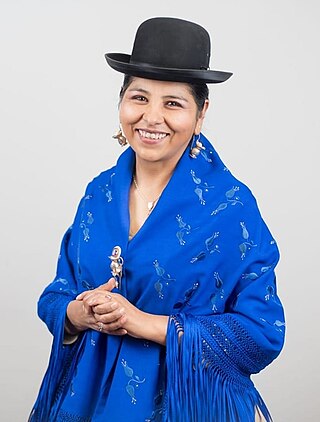
Bertha Beatriz Acarapi is a Bolivian politician and former television presenter serving as a party-list member of the Chamber of Deputies from La Paz since 2020. A member of the Movement for Socialism, she previously served as an El Alto municipal councillor from 2000 to 2004 on behalf of the Revolutionary Left Movement and from 2004 to 2010 on behalf of Plan Progress for Bolivia. During her second term, she served as president of the El Alto Municipal Council from 2006 to 2007, becoming the first woman to assume that post. Outside of politics, Acarapi's lengthy career in radio and television journalism led her to join ATB in 2015, becoming one of the country's first high-profile chola indigenous presenters.
The 2021 La Paz municipal election was held in La Paz, Bolivia on Sunday, 7 March 2021, involving separate contests for mayor and all eleven municipal council seats. Incumbent mayor Luis Revilla was eligible to seek a third term but declined, leaving the mayoralty an open contest. The election was won by former minister of public works Iván Arias of the alliance, who attained a near absolute majority of 49.52 percent against a field of ten other candidates. On the municipal ballot, Somos Pueblo won 48.04 percent of the vote, winning the six seats needed to exercise a simple majority on the municipal council, with the Movement for Socialism taking the remaining five seats. Revilla's party, Sovereignty and Liberty, lost both the mayoralty and all representation on the municipal council, concluding a twenty-year period of political continuity that started in 2000 with the assumption of Juan del Granado.
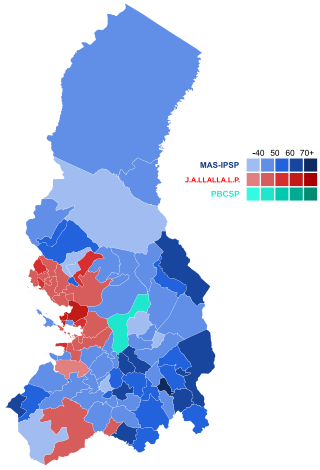
The 2021 La Paz gubernatorial election was held on Sunday, 7 March 2021, with a runoff taking place on 11 April 2021, involving separate contests for governor and all forty-five seats in the Departmental Legislative Assembly. Incumbent governor Félix Patzi unsuccessfully sought reelection to a second term, finishing in fourth place with 4.36 percent of the popular vote. The election was won by Jallalla La Paz's Santos Quispe, who attained 55.23 percent of the vote in the second round, defeating Franklin Flores of the Movement for Socialism. On the legislative ballot, the Movement for Socialism won sixteen of the twenty provincial circumscriptions and nine of the twenty party-list seats, retaining its twenty-five seat majority in the Legislative Assembly.

Freddy Mamani Laura is a Bolivian educator, politician, and trade unionist who served as president of the Chamber of Deputies from 2020 to 2022. A member of the Movement for Socialism, he has served as a party-list member of the Chamber of Deputies from La Paz since 2020. He previously served as executive secretary of the National Confederation of Rural Teachers of Bolivia and as departmental executive of the Federation of Rural Teachers of La Paz. Prior to entering politics, Mamani worked as a teacher, serving as the principal of various rural schools in the department.

Luis Gallego Condori is a Bolivian lawyer and politician who served as a member of the Chamber of Deputies from Potosí, representing circumscription 39 from 2010 to 2015.

Lidia Patty Mullisaca is a Bolivian politician and trade unionist. A member of the Movement for Socialism, Patty represented La Paz in the Chamber of Deputies, first as a substitute alongside Manuel Canelas from 2015 to 2018 and later as a voting member until 2020. She later served as consul of Bolivia to Puno, Peru, in June 2023 and has been vice consul of Bolivia in La Plata, Argentina, since September 2023.
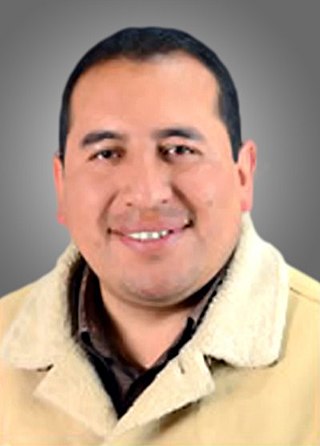
Wilson Pedro Santamaría Choque is a Bolivian lawyer, politician, and sociologist who served as vice minister of public security from 2019 to 2020. A graduate of the Higher University of San Andrés with extensive postgraduate studies, Santamaría entered the political field as a partisan of the National Unity Front and served as the party's municipal leader for La Paz. In 2014, he was elected as a party-list member of the Chamber of Deputies, representing the La Paz Department from 2015 to 2019.
The following is a chronology of notable events from the year 2023 in Bolivia.


















